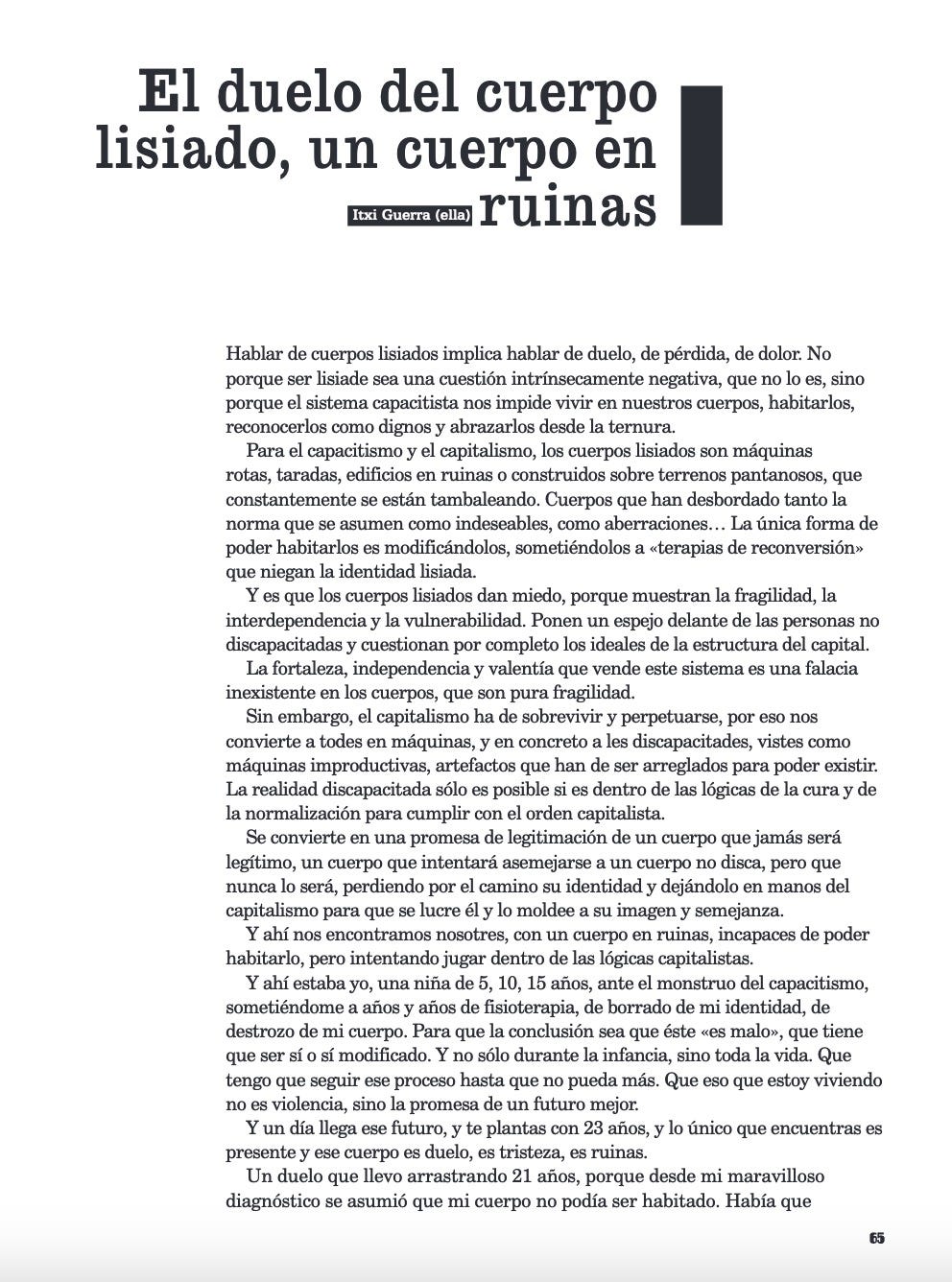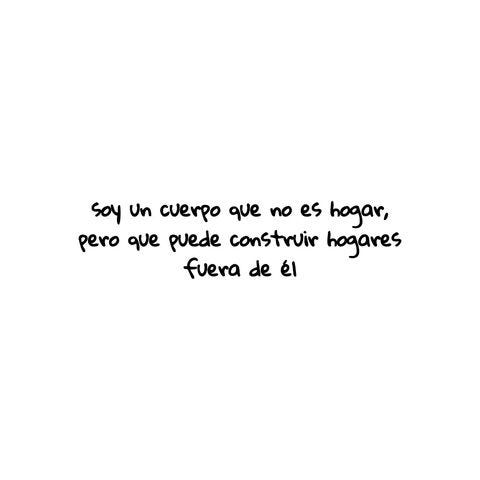The mourning of the crippled body, a body in ruins
A translation of a text by Itxi Guerra that appeared in Madeja
This text by Itxi Guerra ewas originally published in Spanish in Madeja - Revista Feminista in the Nov. 2022 #10 issue: https://www.localcambalache.org/wp-content/uploads/2022/11/Madeja10.pdf
I have tried my best to translate it into English, please feel free to suggest better wording or contribute here: https://cryptpad.fr/pad/#/2/pad/view/uOtz15SnPzk535vONM67X369hxE-4M7Hpezfl51wGPQ/
To speak of crippled bodies implies speaking of mourning, of loss, of pain. Not because being crippled is an intrinsically negative issue, it is not, but because the ableist system prevents us from living in our bodies, inhabiting them, recognizing them as worthy and embracing them with tenderness.
For ableism and capitalism, disabled bodies are broken machines, handicapped, buildings in ruins or built on swampy ground, seen as if they were constantly swaying. Bodies, that have stretched the norms so much, that they are assumed to be undesirable, to be aberrations. The only way to inhabit them is by modifying them, subjecting them to "re-conversion therapies" which denies the disabled their identity.
Crippled bodies are frightening, because they incorporate fragility, interdependence and vulnerability. They place a mirror in front of non-disabled people and by doing so question all the ideals of capital structure.
The strength, independence and bravery that this system tries to sell us, turns into a fallacy in bodies made out of pure fragility.
However, capitalism has to survive and perpetuate itself, that's why it turns us all into machines, while the disabled in particular are seen as unproductive machines, artifacts, in need to be fixed, in order to even be allowed to exist. The disabled reality only possible within the logic of cure and of normalization in order to comply with capitalist order.
It tranforms into a promise of legitimizing a body that will never be legitimate, a body trying to resemble a body that is not disabled, but that will never be one, losing its identity along the way and leaving it in the hands of capitalism, to extract profit from it and to mold it in its image and in its likeness.
And that is where we find ourselves, with a body in ruins, unable to inhabit it, but trying to play along according to the capitalist logic.
And that is where I was, a girl of 5, 10, 15 years old, confronted with this monster called ableism, submitting myself to years and years of physiotherapy, of erasing my identity, destroying my body. The conclusion being, that my body "is bad", that it has to be modified. And not only during childhood, but throughout all of my life. I have to follow this process until I can't do it anymore. What I live through would not be violence, but the promise of a better future.
And then some day that future arrives, and you are now 23 years old, and the only thing you find in this present is a body in mourning, in sadness, in ruins.
A mourning that I have been dragging along with me for 21 years, ever since the wonderful diagnosis, it had been assumed that my body could not be inhabited. It had to be modified in order to exist. Because it was bad, a burden, it was useless. Only by altering the body would it be made worthwhile. Only by curing the body would it be desired, desirable, productive, useful.
Bodies are not there to simply exist, but to be used, either for their erotic capital or for their labor power, as such they are understood only as machines of production. But when disabled bodies are seen as broken, never productive, they can neither form a nuclear family, nor sustain the system. They are not meant for these things, lucky for them, they are not.
For me to inhabit a crippled body is to live in constant insecurity. They made us believe that our bodies are uninhabitable, and we have ended up believing them. They made us believe that nothing can sprout from ruins, that it was final; that our only option was to be catalysts and repositories for violence. Sadness is a part of disability, simply because, how could there be joy and pride among the ruins, how can a broken machine exist without being discarded?
Part of this mourning in the recognition of the loss of our body, is to become aware, that within these ruins there exist possibilities of creation and resistance.
These ruins can be the start of the destruction of the system itself.
To not be seen as a functional entity by capitalism, one that is not meant to reproduce the model of the nuclear family, one that breaks with erotic capital... it offers strategies to confront the system. To stop it in its tracks and to propose new forms of existence, based on interdependence, vulnerability and radical tenderness.
Mourning means, to recognize oneself as being in the margins and to try to make a home there. To build alliances with other marginalized bodies and together create safe spaces. To inhabit these margins is difficult, but doing it hand in hand with companions makes it that little bit more loving and bearable.
Mourning also opens up the opportunity for us to squat our abandoned bodies. To rebuild them as we please and, as Tess Hache (2022) says, to turn them into homes again, for those of us, who have lost our bodies to ableism.
It opens up an opportunity to bring out our crippled pen to make it shine. To reappropriate our bodies, our mobility devices, our movement.... To make them sparkle as if we had a party, to make anyone who passes us uncomfortable when they see our crippled bodies. Let the search for capitalist legitimization disappear, to give way to pride, bliss, pleasure and the enjoyment of these feats.
By breaking and stretching all the norms on purpose. By making capitalism aware that our bodies are territories of conflict that have stood up, rebelled against and will never again submit to its ableist power.
Life, care, tenderness and pleasure are at the core, and nothing and no one will ever have the power to displace these, because we are here to stay and to make them feel uncomfortable instead. Because, as Yo, Tullida sums it up, and while this quote by Néstor Perlongher speaks of homosexuals, it is nevertheless applicable for cripples:
"We don't want to be persecuted, or studied, or discriminated against, or killed, or cured, or analyzed, or explained, or tolerated, or understood: what we want is to be desired" (Perlongher, quoted in Yo, Tullida, 2019).
Bibliography
HachE, Tess [tesshache_], (2022, 28 marzo), soy un cuerpo que no es hogar, pero que puedo construir hogares fuera de él. soy un cuerpo que [Imagen]. Instagram.
Yo Tullida, (2019, 22 noviembre), No queremos que nos maten ni que nos curen, queremos que nos deseen. Página 12. https://www.pagina12.com.ar/232295-no-queremos-que-nos-maten-ni-que-nos-curen-queremos-que-nos-






